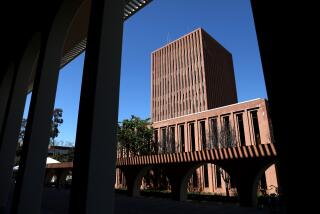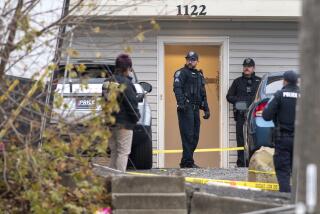USIU Would Sell Properties Under Bailout Plan
- Share via
Beleaguered United States International University has proposed a two-year reorganization plan with the U.S. Bankruptcy Court to pay back creditors by selling its prestigious London campus as well as undeveloped property in Scripps Ranch.
The university filed the plan Wednesday in the second stage of its bankruptcy proceedings, designed to put the private institution back on its feet.
The proposed plan makes sale of the property the centerpiece of efforts to pay off a debt estimated at $14 million to $25 million. The university pegged its debt at $14 million when it filed for bankruptcy in December, 1990, but creditor claims since received total nearly $25 million, although they have not been agreed to as yet.
Among the larger creditor claims are those of Mission Federal Credit Union at $4.6 million as well as many professors and other employees with unfunded pension plan payments totaling $3.5 million.
The 38-year-old school has continued to operate since that time by slashing monthly expenses by $403,000 through suspension of its intercollegiate athletic program and several fine arts majors, as well as the layoffs of 64 employees. It now has 2,070 students, 56% of them in graduate programs.
USIU has taken on no additional debt and is now meeting its monthly expenses, David Osias, the attorney handling the bankruptcy and reorganization case, said Thursday.
The proposed plan states that a local San Diego broker estimates the value of 57 undeveloped acres at its 160-acre Scripps Ranch campus at $150,000 an acre, or $8.5 million for the parcel.
Osias said the university expects to receive a minimum $5 million net from such a sale. The land is zoned for educational use and could not be rezoned for residential properties without changes to San Diego’s General Plan.
The 90-acre London campus, built in 1899 as the Royal Masonic Institute for Boys, is worth $35 million to $38 million, according to brokers retained by USIU, Osias said. Because there is an $8.5-million loan secured by the London property, Osias said, the university would expect a minimum $15 million from the London sale.
“We have proposed a two-year period (for the sales) because the professionals we have counseled with tell us that would be a reasonable time limit,” Osias said.
USIU also has campuses in Mexico City and Nairobi, Kenya, which are not affected by the reorganization, Osias said.
The university also could sell $7 million in promissory notes that it holds as a result of its sale last year of its share of KUSI-TV, Channel 51. Osias said the notes will be sold only if money from them is needed in the event that the land sales are delayed.
The notes would probably sell in the $2-million or $3-million range because one of them, for $3 million, pays no interest and the principal is not due until the year 2000. The other note for $4 million pays 10% annual interest and is due in 1997.
A hearing will be held June 19 on the plan, at which time changes could be made based on recommendations from creditors, from USIU or from the bankruptcy court trustee. A final version of the plan will be voted on by creditors sometime this summer. If approved, the plan could go into effect in August.
The plan is also important for USIU in retaining its academic accreditation with the Western Assn. of Schools and Colleges.
The university is on notice by WASC that it must improve deficiencies in academic and financial programs in order to continue receiving WASC approval. Without that, USIU would not qualify for federal student loans for scholarships, and its academic degrees will have less value to employers or other schools.
A WASC group visited the campus earlier this month and will make a recommendation to the association in June. WASC has found improvements in the campus academic programs this year, but is still bothered by USIU’s precarious financial position.
More to Read
Sign up for Essential California
The most important California stories and recommendations in your inbox every morning.
You may occasionally receive promotional content from the Los Angeles Times.













